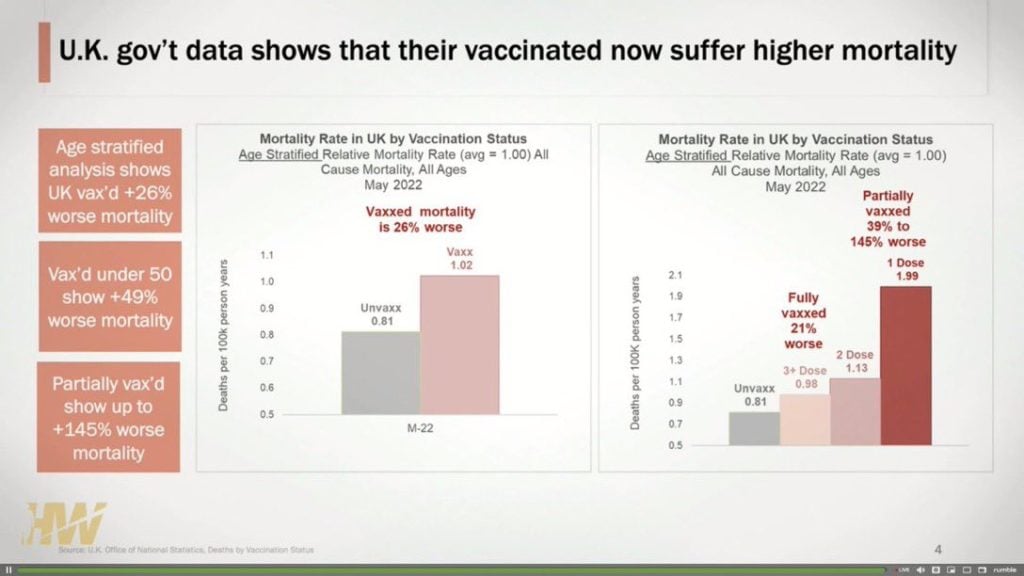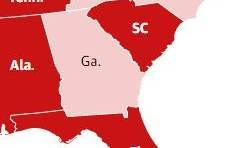GEORGIA UPDATES:
1. Federal judge refuses to block GA’s new election integrity law
2. Report: Over 7,700 Ballots Missing Tabulation Record In Cobb County GA
3. Merrick Garland’s Case Against GA Is a Loser, According to Legal Scholars and Journalists
🚨If you appreciate the updates, news, and videos, PLEASE "Give Once" with this link OR "Subscribe" for just 15 CENTS per day ➡ https://patrickbyrne.locals.com/support ⬅ 100% of your gift/subscription is donated to The America Project which is Funding the Audits!
1. Federal judge refuses to block Georgia’s new election integrity law: Court says it doesn’t want to impede summer elections, liberal plaintiff failed to show imminent constitutional harm warranting an injunction. federal judge on Wednesday refused to block Georgia’s new election integrity law from taking effect, saying a liberal group’s request for a preliminary injunction failed to show imminent constitutional harm and would disrupt upcoming elections in the state. “The Court is not persuaded by Plaintiffs’ argument for a bright line exception to Purcell because they have alleged First Amendment harm. Plaintiffs have not provided authority, nor is the Court aware of any, that would support this interpretation of the law,” U.S. District Judge J.P. Boulee ruled in an 11-page ruling rejecting the challenge by the Coalition for Good Governance. Boulee also wrote he was disinclined to “change the law in the ninth inning” when Georgia has runoff elections for seats in the Georgia state House planned for later this month. “Election administrators have prepared to implement the challenged rules, have implemented them at least to some extent and now would have to grapple with a different set of rules in the middle of the election,” Boulee wrote in an 11-page order. “The risk of disrupting the administration of an ongoing election … outweigh the alleged harm to plaintiffs at this time.” Boulee’s ruling marks the first time Georgia’s new election rule, which includes expanded voting opportunities and voter ID requirements, passed a legal test. It still faces a second challenge filed recently by the U.S. Justice Department, which is pending in the courts. The decision follows just days after the U.S. Supreme Court upheld new election integrity laws in Arizona banning ballot harvesting and votes cast in wrong precincts. The justice ruled such security provisions did not target minorities and therefore were constitutional, a ruling that could have an impact on future challenges to the Georgia law. Marilyn Marks, executive director of the Coalition for Good Governance, said her group will file more lawsuits challenging other provisions of the law. “We’re concerned about the voter confusion that will no doubt occur with these little-known rapid changes to the rules, including the required information on ballot applications and the short deadline for applications to be received in this last week before the election,” Marks said in a statement, reported the Atlanta Journal-Constitution. From: justthenews.com/politics-policy/elections/federal-judge-refuses-block-georgias-new-election-integrity-law
2. Report: Over 7,700 Ballots Missing Tabulation Record In Cobb County GA - Last week Georgia elections activist Kandiss Taylor reported that she and a team of audit volunteers had discovered over 168,922 early advanced votes have no chain of custody in Cobb County alone. Part of the authorized procedure for closing a precinct for advanced early voting or election day voting is to print the tabulation tapes from each ballot scanner. These scanners are the ones the voters use to scan their ballots produced from the ballot marking device (BMD). These tabulator tapes from the ballot scanner are an exact tally of the total number of votes from scanned ballots by all voters in that precinct. The tabulator tapes are the only legal record of our votes cast that are requested by the Superior Court in each county for safekeeping. The tapes are to be sent to the Clerk of the Superior Court, as soon as possible, after the ballot scanner is closed. These tabulator tapes are a hardcopy source document of the computer memory card and reflect the information that is electronically conveyed through the voting system. These tapes, along with the memory cards, are used in the process to certify an election at the county level and how the Secretary of State certifies, which leads to the Governor’s formal certification of the election. However, the Cobb County Elections Director has failed to supply the missing tabulation tapes from two advanced voting precincts that support the election certification results to the auditing team. Because this Election Director has already overwritten the memory cards, the missing tabulation tapes cannot be recreated. Therefore, there are 7,705 votes missing. Two Missing Tabulator Tape Totals from Two Separate Voting Precincts. The Cobb County Election Summary Report, when examined and compared to the tabulation tapes, shows the 7,319 missing votes from advance voting but NOT the 386 votes missing from election day, for a total of 7,705 missing votes in the county. When questioned about the missing votes, the Director of Elections could not reproduce the tabulator tape information from the Secretary of State’s website, and therefore, had to call in a Dominion technician to open the central tabulation server at the Cobb County office to retrieve to the missing vote count. However, that information, when submitted to the audit group was insufficient and was missing pertinent information from the tabulation tapes. Also, this is not a substitution for the official tabulator count of total votes. The chain of custody in this process by the director calls into question the validity of the missing 7,705 votes. The previous finding of the missing chain of custody of 168,922 ballots and missing tabulation tapes for 7,705 ballots shows that proper election procedure is not being followed in counties such as Cobb County. This election should NOT have been certified without these records. The state of Georgia was less than a 12,000 vote difference. From: thegatewaypundit.com/2021/07/report-7700-ballots-missing-tabulation-record-cobb-county-georgia/
3. Merrick Garland’s Case Against Georgia Is a Loser, According to Legal Scholars and Journalists: Writers for The Wall Street Journal (WSJ) as well The Federalist this week published pieces that told U.S. Attorney General Merrick Garland that his case against Georgia’s voter integrity law is destined to fail.
The writers also told Garland that he’s better off abandoning the case.
Members of The WSJ’s editorial board published an opinion piece Monday and called Garland “the front runner so far for 2021’s bad timing prize.”
“The Justice Department last month rushed out a lawsuit claiming that Georgia’s new election law violates Section 2 of the 1965 Voting Rights Act only days before the Supreme Court laid down standards that make the lawsuit a nearly certain loser,” WSJ editorial board members wrote.
“Justice knew the likely timing of the Court’s ruling in Brnovich v. DNC, so a fair guess is that Mr. Garland succumbed to White House and progressive pressure to make a political statement to support Democratic efforts in Congress to federalize state election laws in H.R.1.”
In a 6-3 vote, the U.S. Supreme Court last week upheld two Arizona rules implemented in an attempt to increase overall election security. Arizona Attorney General Mark Brnovich celebrated the decision. The measures aim to limit the opportunity to commit voter fraud and strengthen the integrity of the state’s elections.
Specifically, one provision prevents the use of third-party ballot harvesting — a practice that allows political operatives and others to collect voters’ ballots and submit them to polling stations in large numbers. The other policy requires election officials to throw out ballots cast in the wrong precincts. Supporters argue this measure prevents individuals from voting in multiple locations.
Justice Samuel Alito wrote the majority opinion for the case.
Members of The WSJ editorial board wrote that Garland, in pursuing the case against Georgia, “will have to contend with Justice Samuel Alito’s five principles in Brnovich as they assess the Georgia statute.”
Margot Cleveland, a senior writer for The Federalist, listed five guideposts from the Brnovich case:
• The size of the burden
• The degree to which the voting rule departed from the standard in 1982 when Congress amended Section 2
• The size of the disparity of the rule on minorities
• The opportunities provided by the state’s entire voting system
• The strength of the state’s interests in the law.
WSJ Editorial Board members said “it won’t be easy to find legal fault under those principles.”
“Mere voting inconvenience can’t be considered disqualifying, since all voting imposes some inconvenience. Any specific voting provision, such as the number of drop boxes, must also be considered in the overall context of a state’s voting rules,” The WSJ Board members said.
“Georgia’s rules are generally lenient and don’t especially burden the ability of minorities to vote. Perhaps Justice can find a federal judge somewhere to rule against Georgia, but such a ruling is unlikely to survive on appeal to higher courts.”
Cleveland, meanwhile, said the Biden administration’s lawsuit against Georgia’s voting rules “is legal hot garbage.”
Writing for USA Today, legal scholar Jonathan Turley wrote last week that “the Biden administration is setting itself up for failure.”
“The case is weak, the precedent is hostile, and timing is suspect. So why would Attorney General Merrick Garland green light a case that seems likely to fail in spectacular fashion?” Turley asked.
“While I have great respect for Garland, this does seem like a rare moment of weakness in yielding to political pressure from the White House and Congress. The lawsuit legitimates Biden’s over-heated rhetoric on Republicans dragging the nation back into the Jim Crow era. Garland has been under increasing pressure for failing to use the Justice Department more aggressively against Republicans.”
U.S. Justice Department officials announced on their website last month that they filed a lawsuit against the State of Georgia, the Georgia Secretary of State, and the Georgia State Election Board over SB 202, which Gov. Brian Kemp signed into law in March. The United States’ complaint challenges provisions of SB 202 under Section 2 of the Voting Rights Act.
“The United States’ complaint contends that several provisions of Senate Bill 202 were adopted with the purpose of denying or abridging the right to vote on account of race,” according to the U.S. Justice Department.
“The Justice Department’s lawsuit alleges that the cumulative and discriminatory effect of these laws—particularly on Black voters—was known to lawmakers and that lawmakers adopted the law despite this.”
Georgia’s new voter reform requires, among other things, voter ID on all absentee ballots, increased oversight of local election boards that fail to follow state election law, and secured drop boxes around the clock.
The November 2020 election, according to Kemp, had a 350 percent increase in the use of absentee balloting, more than 1.3 million absentee ballots total compared to election day in 2018.
“This obviously led to local election workers having to process far more ballots using a time-consuming, labor-intensive and at times arbitrary process,” Kemp said earlier this year.
“By moving to a state-issued ID requirement instead of a signature match, Georgia will dramatically streamline the verification process on the absentee ballot.” From: georgiastarnews.com/2021/07/07/merrick-garlands-case-against-georgia-is-a-loser-according-to-legal-scholars-and-journalists/





















